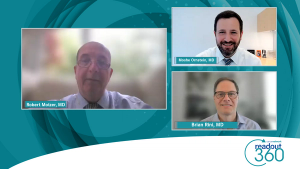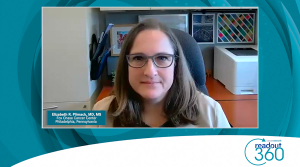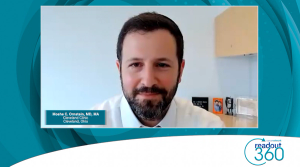Articles by Brian I. Rini, MD

Panelists discuss how the future of renal cell carcinoma (RCC) treatment lies in developing better biomarkers for patient selection, novel immune therapies including chimeric antigen receptor (CAR) T cells and T-cell engagers, HIF-alpha inhibitors, radioligand therapies, and moving beyond the current immunotherapy-based doublet paradigm that has dominated for 7 years.

Panelists discuss how toxicity considerations significantly influence treatment selection given multiple effective options, requiring personalized discussions about patient goals, comorbidities, and tolerance for different adverse effect profiles between immune therapy doublets and immunotherapy-tyrosine kinase inhibitor (IO-TKI) combinations.

Panelists discuss how favorable-risk patients may be candidates for active surveillance if their disease is indolent, while treatment decisions should consider the long-term survival benefits of ipilimumab plus nivolumab vs the higher response rates of immunotherapy-tyrosine kinase inhibitor (IO-TKI) combinations, with pseudoprogression being relatively rare in clinical practice.

Panelists discuss how treatment selection for a typical intermediate-risk patient with clear cell renal cell carcinoma (RCC) involves choosing between ipilimumab plus nivolumab for long-term durable responses in nonsymptomatic patients and immunotherapy-tyrosine kinase inhibitor (IO-TKI) combinations for those requiring rapid disease control or cytoreduction.

Panelists discuss how the CLEAR trial showed pembrolizumab plus lenvatinib achieved the highest objective response rate (71%) and progression-free survival (23.3 months) among frontline regimens, though requiring careful patient selection due to lenvatinib's challenging toxicity profile at the full 20 mg dose.

Panelists discuss how CheckMate 9ER results demonstrated significant progression-free survival and overall survival benefits with nivolumab plus cabozantinib vs sunitinib, with particularly impressive HRs for patients with visceral disease, including liver, bone, and lung metastases.

Panelists discuss how the KEYNOTE-426 trial established pembrolizumab plus axitinib as an effective and well-tolerated immunotherapy-tyrosine kinase inhibitor (IO-TKI) combination with high response rates and unprecedented tumor control, particularly suitable for frail patients due to axitinib's selective targeting and short half-life.

Panelists discuss how the CheckMate 214 study demonstrated durable overall survival benefits with ipilimumab plus nivolumab vs sunitinib, with 9-year follow-up showing improved outcomes even in favorable-risk patients and nearly half of responders remaining in remission.

Panelists discuss how clear cell renal cell carcinoma (RCC) represents the most common kidney cancer subtype, typically affecting men in their 50s and 60s who often present incidentally with metastatic disease, and has limited identifiable risk factors beyond smoking, hypertension, and obesity.
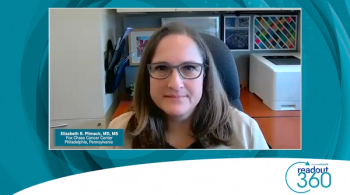
Closing out their program on renal cell carcinoma management, key opinion leaders share closing thoughts on emerging therapies and how the field is evolving.
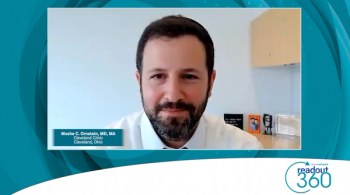
Centering discussion on sarcomatoid and rhabdoid non-clear cell renal cell carcinoma, panelists consider frontline IO-based regimens and their value in this setting.

A brief discussion centered on optimal treatment strategies for patients with chromophobe or papillary kidney cancers.

Key opinion leaders in the field of renal cell carcinoma management reflect on recent data with IO/TKI combination therapy in patients with non-clear cell disease.

Switching its focus to non-clear cell RCC, the panel reviews data presented at ASCO 2023 on KEYNOTE-B61, combining lenvatinib + pembrolizumab in this setting.
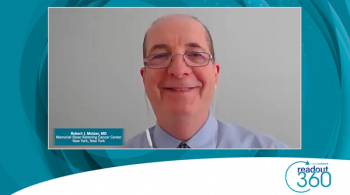
Panelists shed light on key factors that help to inform the selection of frontline therapy in patients with advanced clear cell renal cell carcinoma.

In the context of the available frontline treatment armamentarium for advanced clear cell RCC, key opinion leaders consider how they would select or sequence therapy.

Expert panelists consider how updated data from the CLEAR trial of lenvatinib + pembrolizumab in advanced clear cell RCC have impacted their real-world clinical practice.

Centering discussion on the KCRS 2023 annual meeting, experts in renal cell carcinoma elucidate data from the CLEAR and TRAVERSE studies in clear cell disease.
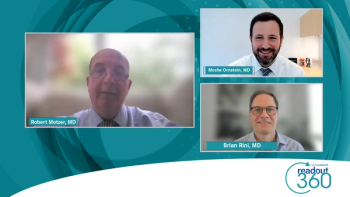
Experts discuss recent data on a triplet combination therapy for patients with advanced non-clear cell renal cell carcinoma.

Drs Robert Motzer and Moshe Ornstein discuss the results of the KEYNOTE-B61 study in patients with non-clear cell renal cell carcinoma.

The panel highlights novel agents under investigation for the treatment of clear cell renal cell carcinoma.

Moshe Ornstein, MD, reviews the design and efficacy and safety data from the phase 3 CONTACT-03 study in metastatic renal cell carcinoma.

Dr Moshe Ornstein details the adverse events seen with IO/TKI combination regimens in patients with advanced renal cell carcinoma and the best strategies for management.

Experts discuss the optimal treatment of patients with renal cell carcinoma and brain, bone, or lung metastases.

Moshe Ornstein, MD, explains how he selects a frontline IO/TKI combination regimen for a patient with advanced renal cell carcinoma.

Dr Brian Rini shares his view on the data comparing IO/TKI and IO/IO combination regimens for the treatment of advanced renal cell carcinoma.

Brian Rini, MD, reviews data from the 5-year analysis of the KEYNOTE-426 trial in advanced clear cell renal cell carcinoma.

Robert Motzer, MD, presents the overall survival analysis data from the 4-year follow-up of the CLEAR study in patients with advanced renal cell carcinoma.

The panel wraps up their discussion with a review of how they would approach treating frontline non-clear cell RCC.

The panel shares how they would treat a patient with advanced RCC after disease progression on adjuvant pembrolizumab.










